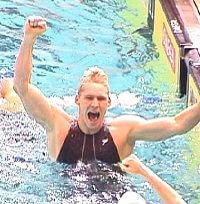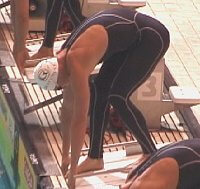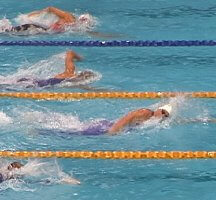Josh Davis Takes His Swimming to Another Level; Retires to Concentrate on Inspiring Youth
By Brent Rutemiller
SAN ANTONIO, Texas, November 9. RECENTLY Josh Davis, at age 34, made the tough decision to stop training for Olympic competition. Swimming World Radio talked with Josh about his career and what motivated him to continue to swim well beyond the normal age of retirement.
Click on the Swimming World Radio button below, on right side, to listen to the entire interview.
Here are some excerpts from that interview:
"One of the messages that I preach and that I live is that I don't live to swim, I swim to live. I will keep racing when I get a chance. I am going to try to race in the U.S. Open. Of course, I am going to do Masters, for sure. I am hooked on that. For practical purposes, there are probably not going to be any more Olympics."
"My current focus is on swim clinics and the opportunity to communicate some good messages. I still need to train to do swim clinics. I have to be able to beat the kids I teach. The point is, I am not moving to Mexico to give an undivided effort to make it to Beijing, which is what it takes these days to make an Olympic team. I am just trying to be truthful to people who were nice enough to write about me moving to Mexico. While I am not moving to Mexico now, it is true that I am transitioning to another (place in my life)."
"My value is more what I can bring outside of my performance at a swim meet. The message I have been able to hone and my ability to connect with the kids and be a spokesman for different companies. It is not so much about how I get from one side of the pool to the other now. It is about how I can embody the messages that these companies want to communicate to a broader audience in the swimming community."
"It is kind of funny that I tell the story that when I was 12 I watched the 84 Olympic Games and I remember seeing Rowdy win his gold medals, and I remember watching the Grosse-busters 800 relay touch out the Germans. I remember having a thought that ‘Golly, it must be amazing to win an Olympic gold medal.' I immediately put the thought out of my mind because I knew it would never happen to me. I just went off and rode my bike to soccer practice. It was later that year that I got involved in swimming for the first time. Obviously, I wasn't that good, but after a year of sticking with it and with a really good coach I had rapid improvement. Two years later when I was 14, I found my niche. I knew this was what I was good at, and this is what I wanted to do. My time as a 14-year-old was a 1:44 in the 200 free, which gave me my first national age group time standard. It was my first top 16 time. That was very exciting. I was ranked in the top 5 at the time. A 1:44 at 14 is pretty good."
"I give a lot of credit to my first coaches Al Marks, Jim Yates and Fletcher Watson with Winston Churchill High School, because my high school team was really a catalyst. It taught us how to set goals. Basically, what Coach Marks does is starts people their freshman year preparing them to be seniors. He teaches them to set goals and teaches them to have a standard of excellence."
"Your first time making a USA team, whether it is a junior team or an international team, there is almost a sense of ‘Oh my gosh. What is going on? Do I really belong here?' Then at the end of the trip after racing and making friends with the team and learning from the coaches, it starts to sink in. ‘Yeah, I do belong here. I do want to do everything I can to make the USA team great. This team needs me. I want to contribute.'"
"I wasn't there yet. I knew I was in a good place for my age group, but I was still so far off what was the Olympic ideal at that time. I remember on that trip to Paris and East Berlin, Matt Biondi joined us. He was like a god. I remember it was cool in 1988 I got to watch him race in the Olympic Trials in Austin, Texas. My mom got me and my swimming buddy tickets. We were front row, middle of the pool in Austin, Texas. I watched Matt Biondi go 1:47.7 in the most perfect freestyle on the planet. I thought, ‘How can anybody go that fast?' I was just in awe when he broke that American record. I was so far off of that. I wasn't tall like him. I didn't look like him. I wasn't strong like him. I tried to make my freestyle like him. I would watch his video every day, trying to have a beautiful freestyle like Matt Biondi. I taped that 88 Olympic in Seoul and I watched it every day. I have every stroke memorized in my mind's eye."
"I had already been reading everything I could get my hands on. I read every word of Swimming World Magazine, but articles really stuck out to me because he was my hero. The theme throughout it is you need to have a love relationship with the water. You really need to think about how you are moving through it."
"I remember the 92 Trials when I was ninth or 10th and swimming in consols. I missed making the finals and was out of it. I just choked like 90 percent of the people do there. I remember saying ‘I am going to come back in four years and I am not going to let this pressure and this craziness get to me. I am going to prepare and I am going to go out and make that team in 96. Obviously, that was good to know that just a year later I was having good progress and putting myself in the position. I can do this. I keep showing up to practice, I can do this."
"94 was an off year except for two races. One was the final event of the men's NCAA in the 400 free relay my senior year. Stanford had won every relay and was winning the meet. We concluded the meet with an American record and touched out Stanford. Gary was a freshman and he split 42.1. I split 42.1 for the fastest splits of the meet. I called it my miracle swim. I never even came close to that time ever since. Later that summer, I had another great swim in the 400 free relay. I was 49.3 going second and Gary anchored in Rome in the summer of 94. I love saying this story, because starting at UT in that 400 free relay, I was second and Gary was fourth. Later that summer in Rome, I was second and Gary was fourth. Then, at the Atlanta Olympics, I was second and Gary was fourth. I owe all my medals to Gary, but I was glad I was able to be a part of them. To have a fast split on the second leg is important."
"I remember having a thought that maybe a year out from the Olympics that I was off by three seconds. Maybe I should just stop. I was trying to get married. I was working part time and going to school full time. I was training full time. It was very stressful. I remember a real turning point for me was two things. Sean Jordan came up to me and said ‘You can do this. You are the best 200 freestyler we got. We need you.' That perked me up. Also, who came up to me was Kris Kubik. He took out a little picture of a gold medal that was printed in the newspaper because they were doing a little story on what the gold medals were going to look like in Atlanta. He cut that picture out and laminated it for me. It was perfect to fit in my wallet. He said, ‘I want you to put this in your wallet, because I think you are going to get one of these next year. When you get your gold medal, I want you to give this picture back to me.' I am blown away. Is this guy nuts? Do you know how hard it is to get a gold medal?
"It really meant so much to me that he believed in me and he encouraged me like that. I had a good practice that day. The next day, I had a good practice. I kind of got back on track. On a sidenote, it is good to get married and stop working and just train full time."
"May of 1995, right in the middle of my slump, I got married. After that, we have saved up a couple thousand dollars from family and friends for me to train that summer. By August of 1995, I go to the Pasadena Summer Nationals. I missed the A team going to race in Atlanta in the Olympic pool for Pan Pacs. I was so bummed."
"John Olson won the 200 free. I didn't even make the final. I was ninth. I did my best in the consol with a 1:50 low. I qualify for the World University Games in Fukuoka, Japan. I am like, I am not on the A team where I need to be, but I will go and maybe I can be a good leader on the B team in Japan. Sure enough, I get elected captain and I also get elected to carry the flag for the whole USA delegation. It was really one of the highlights of my whole career."
"All of the captains from all the sports teams get in a room and vote for who is going to carry the flag. It was huge. After I carried the flag, two days later I asked the coaches that I would really like to lead off the 800 free relay and just get a flat-start time. I wasn't fast enough to be in any individual race. I thought give me a flat time, because I am feeling really good. I go 1:48.4."
"For two years, I hadn't gone 1:48. The other three guys are so jacked up, they go 1:49. They beat their lifetime bests by like a second. Our final time actually was faster than the A team that was racing and won in Atlanta at the same time we were racing. So, we got the prize money for being the best relay that year. The A team didn't get the prize money. I loved it. It was a little divine lesson."
To listen to the more of the interview click the Swimming World Audio Button to the right.
Josh Davis will be at the San Antonio Grand Prix this weekend.






